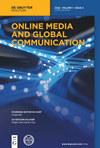Identity, migration, and social media: Generation Z in USMCA
引用次数: 0
Abstract
Abstract Purpose This research analyzes national identity representations held by Generation Z youth living in the United States-Mexico-Canada Agreement (USMCA) countries. In addition, it aims to identify the information on these issues that they are exposed to through social media. Methods A qualitative approach carried out through in-depth interviews was selected for the study. The objective is to reconstruct social meaning and the social representation system. The constant comparative method was used for the information analysis, backed by the NVivo program. Findings National identity perceptions of the adolescents interviewed are positive in terms of their own groups, very favorable regarding Canadians, and unfavorable vis-à-vis Americans. Furthermore, the interviewees agreed that social media have influenced their desire to travel or migrate, and if considering migrating, they have also provided advice as to which country they might go to. On another point, Mexicans are quite familiar with the Treaty; Americans are split between those who know something about it and those who have no information whatsoever; whereas Canadians know nothing about it. This reflects a possible way to improve information generated and spread by social media. Practical implications The results could improve our understanding of how young people interpret the information circulating in social media and what representations are constructed about national identities. We believe this research can be replicated in other countries. Social implications We might consider that the representations Generation Z has about the national identities of these three countries and what it means to migrate could have an impact on the democratic life of each nation and, in turn, on the relationship among the three USMCA partners. Originality/value As one of the few studies carried out on USMCA national identities and by qualitatively exploring the representations that Generation Zers have about them, it may provide information that could contribute to expanding understanding among the citizens of the region.身份、移民和社交媒体:美墨加协议中的Z世代
摘要目的本研究分析生活在美国-墨西哥-加拿大协议(USMCA)国家的Z世代青年的国家认同表征。此外,它还旨在确定他们通过社交媒体接触到的有关这些问题的信息。方法采用深度访谈的定性方法进行研究。目的是重建社会意义和社会表征系统。信息分析采用恒定比较法,辅以NVivo程序。调查结果:受访青少年的国家认同认知在他们自己的群体方面是积极的,对加拿大人非常有利,对-à-vis美国人不利。此外,受访者同意社交媒体影响了他们旅行或移民的愿望,如果考虑移民,他们也会就可能去哪个国家提供建议。在另一点上,墨西哥人对《条约》相当熟悉;美国人分为两派,一派知道一些,另一派一无所知;而加拿大人对此一无所知。这反映了改善社交媒体产生和传播信息的一种可能方式。研究结果可以帮助我们更好地理解年轻人如何解读社交媒体上传播的信息,以及他们构建了哪些关于国家身份的表征。我们相信这项研究可以在其他国家复制。我们可以认为,Z世代对这三个国家的国家认同及其移民含义的表述可能会影响每个国家的民主生活,进而影响三个美墨加协定伙伴之间的关系。作为为数不多的关于美墨加协定国家认同的研究之一,通过定性地探索z世代对他们的表述,它可能提供有助于扩大该地区公民之间理解的信息。
本文章由计算机程序翻译,如有差异,请以英文原文为准。
求助全文
约1分钟内获得全文
求助全文
来源期刊

Online Media and Global Communication
Communication, Media Studies, Internet Studies, International Studies, International Relations-
自引率
0.00%
发文量
0
期刊介绍:
Online Media and Global Communication (OMGC) is a new venue for high quality articles on theories and methods about the role of online media in global communication. This journal is sponsored by the Center for Global Public Opinion Research of China and School of Journalism and Communication, Shanghai International Studies University, China. It is published solely online in English. The journal aims to serve as an academic bridge in the research of online media and global communication between the dominating English-speaking world and the non-English speaking world that has remained mostly invisible due to language barriers. Through its structured abstracts for all research articles and uniform keyword system in the United Nations’ official six languages plus Japanese and German (Arabic, Chinese, English, French, Russian, Spanish, Japanese, and German), the journal provides a highly accessible platform to users worldwide. Its unique dual track single-blind and double-blind review system facilitates manuscript reviews with different levels of author identities. OMGC publishes review essays on the state-of-the-art in online media and global communication research in different countries and regions, original research papers on topics related online media and global communication and translated articles from non-English speaking Global South. It strives to be a leading platform for scientific exchange in online media and global communication.
For events and more, consider following us on Twitter at https://twitter.com/OMGCJOURNAL.
Topics
OMGC publishes high quality, innovative and original research on global communication especially in the use of global online media platforms such as Facebook, TikTok, YouTube, Twitter, Instagram, WhatsApp, Weibo, WeChat, Wikipedia, web sites, blogs, etc. This journal will address the contemporary concerns about the effects and operations of global digital media platforms on international relations, international public opinion, fake news and propaganda dissemination, diaspora communication, consumer behavior as well as the balance of voices in the world. Comparative research across countries are particularly welcome. Empirical research is preferred over conceptual papers.
Article Formats
In addition to the standard research article format, the Journal includes the following formats:
● One translation paper selected from Non-English Journals that with high quality as “Gems from the Global South” per issue
● One review essay on current state of research in online media and global communication in a country or region
 求助内容:
求助内容: 应助结果提醒方式:
应助结果提醒方式:


